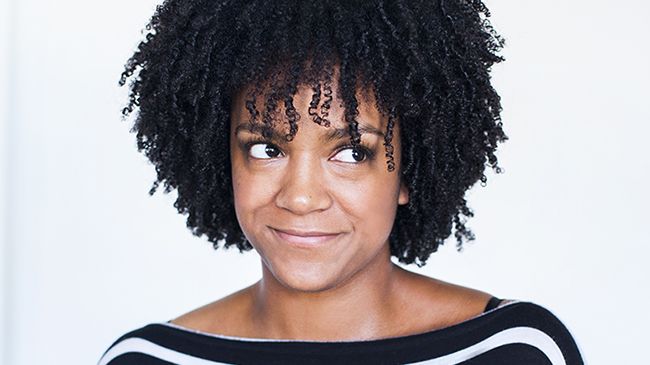Clean hair is healthy hair. Cleansing is essential for your hair to retain moisture and for your scalp to breathe. The LOC method and co-washing are favored by many, but you can only layer on so much until your strands are suffocated. As many curlies avoid high humidity and high dew points to preserve their styles, we tend to forget that moisture in the air does wonders for our hair, and it is difficult to reap those benefits if your hair is smothered in products. Erfrank23 from Q&A wants to know if all buildup is the same.
Question:
If the problem with silicones is that they aren’t water soluble and can build up on hair, isn’t this also true of natural oils, butters and waxes? I cowash, and have started adding some olive oil in my products and have used shea butter and other natural oils and butters, and like the result. But the only way to get them off my hands is to wash them off my hands with soap and water. Won’t they build up as well? Should I start to use a sulfate-free cleanser? And if I’m doing that, I could just start using silicones, right?
Answer:
Yes, all ingredients build up on our hair, but the reasons why curlies are selective about which ingredients we allow to accumulate is because some products 1″> do not have humectant properties, 2″> require harsh surfactants to remove, and 3″> have to be removed more frequently than others.
Moisture retention
Although most curly hair products are formulated with the intention of retaining moisture in the hair, all products are not formulated to attract moisture (i.e. humectant properties”>. When using products with humectants (e.g. honey, glycerin, propylene glycol”> your hair is attracting moisture from the air and not solely preventing moisture from escaping. Ingredients like petroleum and mineral oil are effective at sealing moisture in but they do not attract moisture, which is why some curlies experience dryness relatively quickly following application.
Clarifying frequency
Using products that are designed to repel moisture (e.g. anti-humidity serums“> tend to be chock-full with silicones, which might require a more frequent removal than other products in order to avoid dryness. Whether your hair responds well to silicones is a matter of experience. The controversy surrounding silicones is about the rate at which they build up. There are water-soluble silicone and water-insoluble silicones. Silicones are not bad for our hair, but it would not be ideal to frequently co-wash with conditioners containing silicones and prolong clarifying. This is exactly why the curly girl method (CG method“> suggests eliminating products with silicones. Co-washing with conditioners with water-insoluble silicones, petrolatum, and mineral oil can be counterproductive if moisture from the air cannot penetrate the hair shaft and require frequent removal with harsher surfactants.
Ability to be removed
The primary reason curlies avoid water-insoluble silicones is because many require harsher surfactants for removal as oppose to baking soda and milder surfactants that are in sulfate-free shampoos, cleansing conditioners (co-washes”>, baking soda, or some daily conditioners.
Clarifying is important because excessive buildup blocks moisture from effectively penetrating the hair shaft, but whether a product contains humectant properties, how fast buildup accumulates, and what is needed to remove it are what contribute to curlies being ingredient conscious about what products we are willing to let build up on our hair. It is all a matter of preference and lifestyle. If you put off clarifying to once a month, I would not suggest using products with silicones for maintenance (styling and co-washing”>. If you heat style frequently then silicones are your friend when it comes to thermal protection.
What are you ingredient conscious about?

